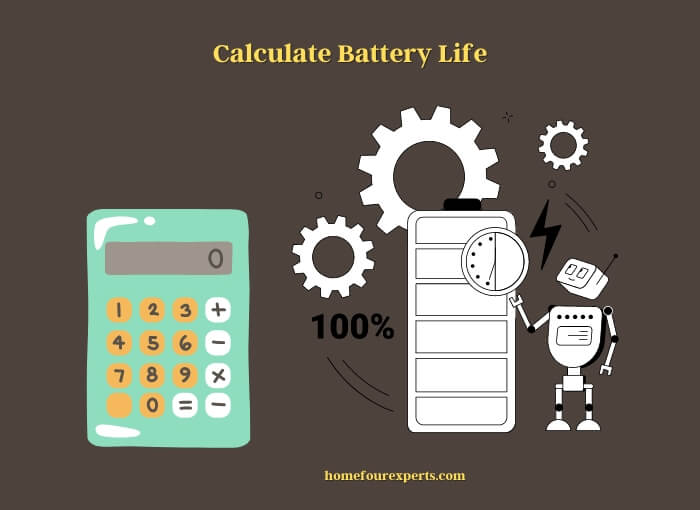Published on: May 25, 2022
Written by Liam Jaxon / Fact-checked by David Rowan
Boating and fishing are no doubt fun and relaxing activities you can do on your weekends or days off. It is an activity where you can get away from the hustle and bustle of city life and think of just pure fun and fulfilling water action.
However, since you use boating and fishing devices, motors and equipment such as a trolling motor battery with a definite useful life per activity, it is important for you to know how long it will last on water, for you to keep safe and avoid getting stranded on water. Thus, this article will teach how to calculate battery life, so that you can prepare ahead of time before you do your boating and fishing activities.
In addition, we will also share you knowledge on how long does a marine battery last, how long does a deep cycle battery last and how to tell if a battery is dead, just to ensure every water activity you embark on is fun, enjoyable and stress-free.

How to Calculate Battery Life
Calculating your marine or deep cycle battery’s life is not as difficult as you think it is. You just have to take note of your marine battery’s amperage hour rating and amperage draw. Then, divide the battery’s amperage hour by its amperage draw.
Use this as an example: If you have a marine battery with an amperage hour rating of 120, and its amperage draw is 30, its battery life or running time is approximately 4 hours. Here is the calculation:
120 amp hour/30 amp draw= 4-hour running time
However, in some cases, what you see is not exactly what you get, because your marine battery’s life is still affected by one uncontrollable factor, and that is the weather conditions while you are doing your water activities.
If you are sailing through calm water conditions, then the calculations above will serve as your reliable reference. However, if you mostly sail on strong current water conditions, then most likely you will change your boat’s speed, which will then affect your battery’s running time. Thus, calculation adjustment or approximation should be done.
How to Tell if Battery is Bad
The first thing you can do to know if your battery is bad is to simply have a thorough look at it. You can tell if a battery is bad if you can see leaks, discoloration, plastic cracks, case bumps, or a broken terminal in your battery. Furthermore, these signs are not just indications of a bad battery, but these are also signs that the battery is actually dangerous to use because it might cause a short circuit, or worse, explosion.
The second step you can take to know if your battery is bad is to take its voltage reading. If the battery is fully charged, and its voltage reading is 0, the battery might have experienced a short circuit or it may have a dead cell.
The last step to confirm if your battery is really a bad battery is to load test it by using a voltmeter. If your battery’s voltage quickly goes down to 0, then, your battery might really be a bad battery.
How to Tell if a Battery is Dead
Nowadays, it is easier for you to tell if your marine or deep cycle battery is dead by using voltmeters or hydrometers. Thus, all you need to do to know if your battery is dead by performing a load test on it. If your marine battery has a capacity of 12 volts and the voltmeter says it has 9V, most probably it has a dead cell, because a healthy and useful 12V battery should be around 13V when at rest.
In addition, you can also tell if your battery is low or dead if you test it, and it shows very low voltage levels.
How Many Amp Hours in a Marine Battery
A battery’s available amp hours serve as a guide for you to know how long you can use the battery before it goes discharged. Usually, marine or deep cycle batteries available in the market nowadays have labels indicating how many amp hours they have. However, to give you an idea, a battery with a low amp charge of around 2-4A is usable and functional for around 8-12 hours. However, it still depends on the battery’s current condition.
You can also use this as an example to know how many amp hours your marine battery has. Let’s say your marine battery has 210 amp hours, and it is given that it has a 20-hour discharge rate. Thus, divide 210 amp hours by 20 discharge rate hours, and it will give you 10.5 amp hours of available power until the battery’s power goes down to 0.
However, it is not advisable to discharge your marine battery all the way down to 0, because it can affect the performance of the battery. Thus, it is recommended that you just discharge 50% of the battery’s capacity.
How Long Will a Deep Cycle Battery Last?
A deep cycle battery lasts and is fully functional for around 2-3 years when taken with great care. Its useful life can even extend if you do not expose it to high temperatures or hot weather conditions because usually, deep cycle batteries last longer when they are exposed to low or cold temperatures.
In addition, your deep cycle battery has a high tendency to last longer if you avoid discharging it all the way to 0. Thus, it is always best and highly recommended to use only a half portion of your battery’s capacity to prolong its useful life as much as possible.
What Factors Should Be Taken Into Account When Calculating Battery Life?
1. Battery Capacity: The capacity of the battery will affect how long it can power a device.
2. Battery Voltage: The voltage of the battery will determine how much power it can provide.
3. Current Draw: The current draw of the device being powered will affect how quickly the battery drains.
4. Ambient Temperature: Operating the device in a warm environment will cause the battery to drain faster.
5. Power Management: Using power-saving features on the device, such as lowering the brightness, can help extend battery life.
6. Battery Age: Older batteries are often less efficient and will drain faster.
7. Charging Habits: Overcharging a battery can reduce its lifespan.
What Techniques Can Be Used to Extend My Device’s Battery Life?
1. Use Low Power Mode: Most mobile devices have a built-in low-power mode that can be enabled to reduce battery usage. This will turn off any unnecessary functions and apps running in the background.
2. Reduce Display Brightness: Your device’s display is one of the biggest battery drains. Reducing the display brightness will help conserve your battery.
3. Turn Off Unnecessary Features: Turning off features such as Bluetooth, Wi-Fi, and location services that are not being used can help conserve battery.
4. Avoid Extreme Temperatures: Extreme temperatures can affect battery life. Avoid leaving your device in direct sunlight or in a hot car for extended periods of time.
5. Use Energy-Efficient Apps: Certain apps are designed to conserve battery life. Look for apps that are designed to be energy efficient and reduce battery usage.
6. Limit Notifications and Background Activity: Limit the number of notifications you receive and the amount of background activity your device is doing. This will help conserve battery.
Conclusion
So, how to calculate battery life?
With this essential information, you know have a deeper knowledge of how your battery can be of best use to you during your boating and fishing activity. Thus, just remember all of these, and rest assured you will have a convenient and stress-free experience in every water activity. Happy boating!
Read more:
About This Writer

Hi, I am responsible for the 'Homeowners Power Solutions' category. My name is Liam Jaxon and a licensed technician with 7 years of experience in vehicle batteries, electrical gadgets, and home appliances. My working experience in different residential & light commercial electrical sectors and the automobile industry helped to acquire vast knowledge in this industry.